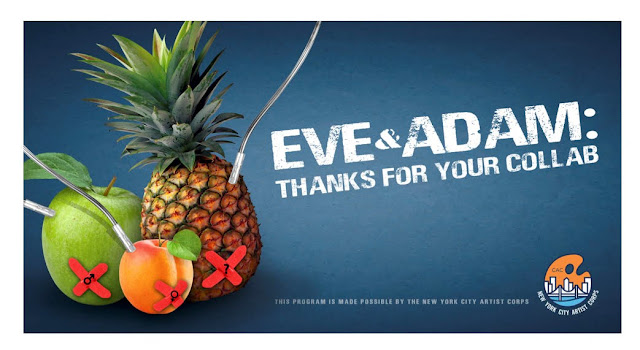Review: "Eve & Adam: thanks for your collab" Takes a Scalpel to Pathologizing Pleasure
Eve & Adam: thanks for your collab
Written by Kasper Klop and Morwenna Spagnol
Directed by Morwenna Spagnol
Presented at Collab NYC
309 Starr Street, Brooklyn, NYC
October 28, 2021
 |
| Image by Samir Djafer |
 |
| Kasper Klop in Eve & Adam: thanks for your collab. Photo credit: Nailah Raab |
 |
Kasper Klop and Morwenna Spagnol in rehearsal for Eve & Adam: thanks for your collab |
Partaking of the proscribed apple and its introduction of shame transitions us into the next segment of the performance, which confronts the audience with unaccommodated man, normatively concealed, and thereby with the construction and imposition of that shame as well. Following on the playfully drawn-out conclusion of this section comes a projected video featuring Klop laying out implements as if for surgery (or, and given the show's critique of the medical establishment, torture) and various fruits (an apple is left until last) being called from a waiting area to undergo something offscreen that sounds distinctly uncomfortable. Fruit are themselves reproductive bodies and long used as figurative stand-ins, whether in canonical literature or emoji, for human genitals; we return to these fruits in a second video segment that picks up the surgical theme and also features repeated cuts to Klop noisily crunching some food, another natural bodily function alongside breathing and sexual activities. Between these videos, Klop, appearing ready to scrub in, speaks from a podium on the dangers of and cures, some disfiguring, for masturbation. Following the second video, Klop hangs from a rope light a sequence of placards displaying information ranging from the text of the Hippocratic Oath to particulars about John Harvey Kellogg, a doctor who hoped that his cornflakes cereal would tamp down sexual desire and whose more aggressive methods to this end are vocalized in Klop's earlier monologue. The audience is then encouraged to leave its seats and examine this exhibit—all of this soundtracked by wild laughter.
Most of us are familiar with the jokes about risking hairy palms and blindness in the pursuit of self-love, but these endlessly repeated witticisms both rest on and occlude a Western tradition of denigrating and controlling sexuality, a tradition which, as the exhibit's timeline shows, has far from disappeared, no matter how much we imagine such ideas as relics of the 19th century and beyond. We might also imagine the medical and religious spheres as oppositional, but, as the show underscores, medicalizing (sexual) morality boasts an extensive history, from 'green sickness' to 'hysteria' to 'inversion,' and so on through the present day. Theater, as an art form defined by bodies coming together in a particular place and time, is perfectly suited to explore these issues, and Eve & Adam: thanks for your collab does so with a supple and spirited blend of cultural critique and humor that spans both mediums and millenia.
-John R. Ziegler and Leah Richards



Comments
Post a Comment